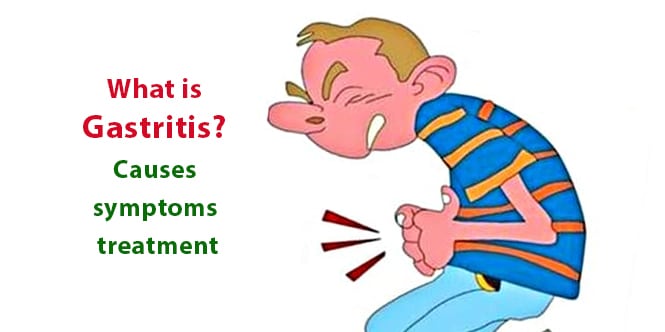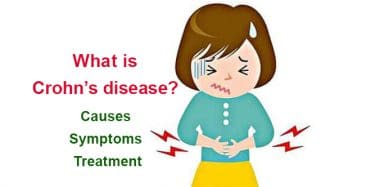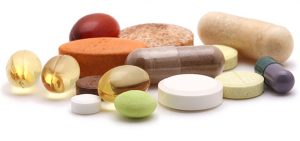Gastritis is a common stomach disease that occurs as a result of inflammation of the gastrointestinal tract. It is characterized by burning, swelling or pain in the stomach. The main reason is a bacterium named helicobacter that settles in the stomach. However, excessive smoking and alcohol consumption, or some painkillers can also cause gastritis. Gastritis is usually not taken seriously, but if not treated, it may increase the risk of ulcer or stomach cancer. It is a disease that responds quickly to treatment and is not a serious disease for most people. It can be treated with medication or proper nutrition. Today, there are very effective drugs used in the treatment of gastritis. People with frequent gastritis may need to undergo a more comprehensive assessment and make lifestyle changes.
Table of Contents
What is Gastritis?
Gastritis is an inflammation, irritation or erosion of the stomach lining. There are 2 types of it: acute and chronic. Acute gastritis is sudden and severe. Chronic gastritis describes a long-term gastric infection that can last for years if not treated. There is also a less common type of gastritis, erosive gastritis, does not cause much inflammation, but can lead to bleeding and ulcers in the stomach. The main cause of gastritis is a bacterium called Helicobacter pylori.
However, regular use of certain painkillers and excessive intake of alcohol can also contribute to gastritis. In some cases, gastritis may increase the risk of developing ulcers and stomach cancer.
Causes of gastritis
The weakness or damage to the barrier that protects the stomach wall causes the digestive juice to damage this membrane. A number of diseases, including Crohn’s disease and sarcoidosis, can increase the risk of gastritis. The most basic reasons are:
- Bacterial infection: Helicobacter pylori-induced infection is one of the most common human infections in the world, but does not cause gastritis or other upper gastrointestinal disorders. Doctors believe that vulnerability to bacteria may be genetic, or may result from lifestyle choices such as smoking, alcohol or malnutrition.
- Regular use of painkillers: Common painkillers such as aspirin, ibuprofen (Advil, Nurofen etc.) and naproxen (Aleve, Apranax etc.) can cause both acute gastritis and chronic gastritis. Regular use of these pain relievers or taking too much of these medicines can leave your stomach vulnerable.
- Age: The stomach lining tends to thin with age and the elderly are at higher risk of experiencing H. pylori infection or autoimmune disease than younger people.

- Excessive alcohol use: Excessive alcohol use is likely to cause acute gastritis. Alcohol can irritate your stomach and this makes it more sensitive to digestive juice.
- Stress: Severe stress due to major surgical operation, injury, burn, or severe infections can cause acute gastritis.
- Own body’s attack to the stomach cells: This type of gastritis, called autoimmune gastritis, occurs when your body attacks cells that form the stomach membrane. This reaction can damage the protective barrier of your stomach. Autoimmune gastritis is more common in people with other autoimmune disorders including Hashimoto’s disease and type 1 diabetes, and may be associated with vitamin B-12 deficiency.
- Other diseases: Gastritis can be associated with other medical conditions including HIV / AIDS, Crohn’s disease and parasitic infections.
- Regular smoking and use of tobacco,
- Radiation therapy,
- Nutrition with excessive fatty foods
- Stressful life
Gastritis symptoms
- Nausea
- Swelling of the abdomen
- Abdominal pain
- vomiting
- Indigestion
- Burning or bowing sensation in the stomach at night or between meals.
- hiccups
- Loss of appetite
- Vomiting blood or coffee ground-like material
- Black, tarry stool
Gastritis symptoms vary from person to person, and even no symptoms may be seen in many people.
Diagnosis of gastritis
To diagnose gastritis, your doctor will review your personal and family medical history, conduct a comprehensive physical assessment and, if necessary, recommend any of the following tests:
- Blood test: It is done to determine whether or not there are H.pylori bacteria in your stomach. Also, if there is an anemia due to gastric bleeding, this can also be diagnosed by a blood test.
- Breath test: This is another test to determine if you have H.pylori bacteria in your body. For this test, a small glass containing radioactive carbon contains a clean, tasteless liquid. H. pylori bacteria break down the test fluid in your stomach. Then, blow into a sealed bag. If you are infected with H. pylori, your breath sample contains radioactive carbon.
- Stool test: The presence of H. pylori virus and the presence of blood in the stool is examined. If blood is present, this indicates a stomach bleeding.
- Upper gastrointestinal endoscopy: Your doctor may want to do endoscopy to control your inflammation and your stomach. Endoscopy is performed using a long tube with a camera lens at the tip. During the procedure, your doctor will carefully place the tube so that the esophagus and stomach can be seen. When they find something unusual during examination, your doctor can take a small sample of the stomach for biopsy.
- Upper gastrointestinal x-ray: This method examines the inflammation of the stomach and small intestine. Your doctor takes a X-ray of your digestive system after swallowing a barium solution. This helps to distinguish the problemmatic areas.
Gastritis treatment
Gastritis treatment may vary depending on the type and cause of gastritis. Some pain medications, smoking or alcohol-induced acute gastritis may be cured by stopping the use of these substances. Or you can treat food-induced gastritis by starting a proper diet.
For example, you may need to remove products containing lactose or gluten from your diet. But if you have a chronic gastritis problem, your doctor may prefer medication.
Gastritis medications
- Antibiotics: Your doctor may recommend an antibiotic combination such as clarithromycin (Biaxin) and amoxicillin (Amoxil, Augmentin, etc.) or metronidazole (Flagyl) to destroy the H. pylori bacteria in your digestive tract. You should make sure that you do not interfere with this treatment, which usually lasts for 7 to 14 days.
- Proton pump inhibitors: These drugs are drugs that inhibit acid production and promote healing. It works by blocking cells forming the stomach acid. Omeprazole (Prilosec), lansoprazole (Prevacid), rabeprazole (Aciphex), esomeprazole (Nexium), dexlansoprazole (Dexilant) and pantoprazole (Protonix) are drugs included in this group.
Prolonged use of proton pump inhibitors, especially at high doses, may increase the risk of pneumonia, increased risk of hip, wrist and spine fractures. Ask your doctor if you need calcium support.
- Acid blockers: Drugs used to reduce acid production. They are also called histamine (H-2) blockers. Reduces gastric pain and promotes healing by reducing the amount of acid released into your digestive tract. The acid blockers sold as prescription or over-the-counter include ranitidine (Zantac), famotidine (Pepcid), cimetidine (Tagamet HB) and nizatidine (Axid AR).
- Ant-acids: Anti-acids neutralize available stomach acid and relieve heartburn quickly. Your doctor may include an antacid in your medication. Among the side effects, you should use anti-acids with constipation or diarrhea in the control of your doctor.
How long does gastritis treatment last?
The treatment duration depends on the type of the gastritis. If there is a chronic type of gastritis, the medication given by the doctor should be taken as prescribed to eradicate bacterial infection. This treatment may take approximately 1 or 2 weeks. In the case of acute gastritis, if you leave the factors that cause gastritis such as excessive alcohol or tobacco use and aspirin, the disease will recover quickly afterwards.
Differences between gastritis and reflux
Although some of the symptoms are similar, reflux and gastritis are different. Reflux occurs when the stomach acid flows backwards to the esophagus. You may even taste regurgitated food or sour liquid at the back of your mouth. Reflux usually occurs after meals, and often the problem is malnutrition.
The disease can be triggered by over-consumption of spicy, fatty foods, chocolate, alcohol, or the consumption of various juices and can be cured by the removing these foods from your diet. The definition of gastritis on the other hand, is the inflammation of the stomach lining. Symptoms of reflux are classical symptoms of heartburn, as well as chronic cough, and voice changes.
In gastritis, additional symptoms such as nausea, bloating and / or anorexia, and black stool and / or vomiting may occur. In addition, reflux is mostly associated with malnutrition, especially chronic gastritis is mostly caused by H. pylori bacteria and can only be treated with medication.
Gastritis diet and nutrition
Food to avoid
- Coffee
- Chocolate
- Alcohol
- Fried food
- Candy
- Artificial sweeteners
- Processed foods
- High-fat dairy products
What is good for Gastritis?
- Kefir (bacteria containing L. Casei) fight infection in the intestine.
- Fruits
- Vegetables
- Fresh fruit juice
- Whole grains
- Lean meat
- Coconut oil that kills bacteria and reduces inflammation.
- Sugar cane molasses is a highly nutritious sweetener.
Vitamin supplements for gastritis
- Vitamin B complex
- Vitamin C (sodium ascorbate)
- Probiotics
Herbal treatment for gastritis
Herbal treatments can be a good option for gastritis. Herbs are very easy to find and buy, and when used with caution, they have the ability to treat the body without tiring metabolism. It can be taken as tea or capsules.
To make a herbal tea, put 1 teaspoon or a pinch of the herb you want to make your tea into a cup. Pour over 1 cup of boiling water. Leave tea for 10 minutes, and filter it. You can sweeten your tea with honey. Artificial sweeteners or sugars are not recommended because of their tendency to worsen gastritis. The tea you prepare can be drunk as hot or cold, but not too hot.
Herbs good for gastritis
- Fresh ginger
- Mint
- Yellow daisy
- Fennel
- Catmint
Catmint, fennel and chamomile tea can be drunk before bedtime due to the relaxing effects. Ginger and mint are more stimulating and more suitable for the morning. None of these herbs contain caffeine and you can drink easily at any time of the day.
- Green tea is another medicinal tea for gastritis. Green tea should be brewed only for two minutes. Because it contains caffeine, it is better not to drink later in the day. Also green tea is a good alternative to coffee that should be avoided during the treatment of gastritis.
- Thyme and turmeric are two excellent antibacterial and anti-inflammatory herbs, particularly good for gastritis due to infection. These herbs can be consumed more easily in capsule form.
- Slippery elm and marshmallow roots are mucilaginous (sticky) herbs and have stomach sedative properties. They are soft and nutritious herbs. They can be consumed as tea or capsule form, but for those who do not consume these herbs before, the tea may be softer.
In addition to herbs, it is also necessary to address the cause of gastritis to alleviate symptoms and cure it.
Recommendations to gastritis patients
- Avoid smoking and alcohol.
- Do not drink, especially those that increase stomach secretion, such as black tea and dark coffee.
- Avoid foods that are oily, salty, bitter, and spicy.
- You can consume plenty of foods high in fiber
- Drink 2 liters of water per day.
- Take care to eat foods that are easy to digest.
- Do not stay hungry for a long time.
- Never skip the morning breakfast.
- Make sure that the food you consume is not too cold or too hot to prevent damage to your stomach, mouth and esophagus.
- Green tea, cranberry, celery, pepper, cherry, apple like fruits and vegetables having flavonoid or bright color are also seen as good foods for gastritis.
- You can safely consume foods with vitamins A, C and K.
- Increase the consumption of foods such as fish, chicken and milk, which are shown as low-fat protein sources. Take care to cook these foods with very little oil.
- Probiotics are the most important food sources that prevent bacterial infections. You can protect your stomach health by using probiotic pills that you can find in pharmacies or probiotic yogurt.
- The use of cooked vegetables, pasta, low-fat soup, boiled rice and low-fat dairy products is good for gastritis. Also check: >>> Gastritis





Hello, pain right side so check